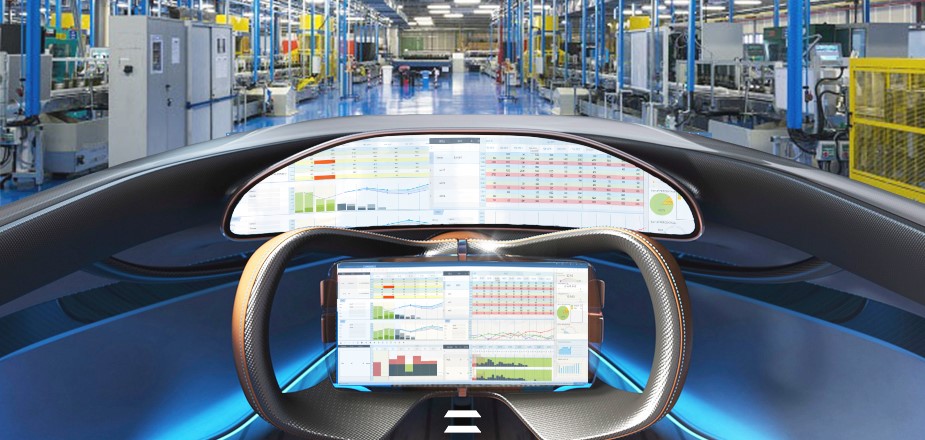In manufacturing companies, it is essential to have full control of the main business process: production. Today there are tools that, thanks to what-if simulations, databases in RAM and detailed scheduling, allow you to have full control of the production flow and its future developments.
Whatis production control?
Control means “Control and its result; verification, ascertainment of the existence of a fact or the accuracy, correct functioning, regularity of something, from an administrative or technological point of view” (source: Treccani). This concept, applied to production, explains the indispensable need that a manufacturing company has to verify its correct and regular operation.
Why do companies seek production control?
It is vital for a company to be able to know that its production process is taking place in a regular and correct manner, in order to meet demand. Very often manufacturing companies are faced with critical situations in production such as late orders, products whose processing is interrupted due to missing pieces in stock, bottlenecks, unforeseen events of various kinds and so on. These problems affect the main production process and it is therefore essential to have full control of it, in order to predict and prevent the occurrence of harmful events.
Who is in charge of controlling production?
There are several roles that have to do with production control and they do it for different reasons:
- Planning
Manager: schedules production operations, both personnel and machinery until the best production plan is achieved. It is responsible for updating the latter following the arrival of new production orders as well as the occurrence of unforeseen events. - Operations Manager: who is responsible for managing their team in order to deliver products on time every time. Makes decisions about people, processes and production based on accurate and up-to-date data.
- Supply Chain Manager: keeps inventories, supply chain operations and related indicators such as service level under control to verify compliance.
- CFO (Chief Financial Officer): controls indicators such as inventory levels and quality from a financial point of view, trying to minimize costs and ensure that production is profitable.
- CIO (Chief Innovation Officer): he is responsible for information services, therefore he must guarantee colleagues the best platforms for their purposes and functions, so that they have the best tools at their disposal that allow them to achieve the objectives set.
How to get production control?
Today, manufacturing companies can use advanced software tools that, thanks to algorithms and calculation capabilities, allow them to gain full control of the production department. These applications, called APS (i.e. Advanced Planning and Scheduling software) allow the user to govern the capabilities of plants and machinery, making decisions quickly and reliably. The management systems are now supported by these specific and dedicated software that, thanks to unique features such as the Database in RAM and optimization algorithms, allow you to eliminate the complex structures of hundreds of Excel while obtaining benefits that translate into a competitive advantage.
Solutions for production planning and control
The main purpose of a production planning and control system is to reach the optimum point in the use of company production resources, while respecting the delivery dates to the customer, increasing productivity and reducing production and warehouse costs.
For this reason, the production planning and scheduling system plays a fundamental role in production companies, being the tool used by planners to organize and control the production process. Thanks to this tool, planners can make the best use of the materials available, organise resources and machinery, and comply with existing constraints and limits to deliver products to customers on time.
Additional benefits of using this tool come when the APS tool is shared by the planning department, perhaps only with reference to certain functions, with the production, sales and purchasing departments. Being able to have a single source from which the production plan springs, allows you to avoid misunderstandings and information barriers while increasing the speed in procurement, production planning and communication of progress to customers.
The benefits of an APS for production planning and control
Using the best APS solutions to schedule, schedule and manage production allows you to achieve numerous benefits, on multiple fronts.
Getting rid of hundreds of isolated Excel files that create obstacles to information and having a single source when it comes to production planning is the first big benefit.
Quickly calculating what-if simulations thanks to the database in RAM, simulating and comparing different future scenarios, allows you to choose the best possible plan.
Obtaining full control of the plant, checking the progress of orders, rescheduling production following endogenous or exogenous variations is the main benefit for those looking for the best production control.
Finally, those who adopt the best solutions for production planning can use a customizable tool, with intuitive graphics that allow the rapid identification of the salient aspects as well as a tool that can be highly integrated with the solutions already present.
Gain full control of your production
Contact us today and discover the CyberPlan solution, software to plan and schedule production in an advanced way, from S&OP to detailed scheduling. Let us explain how the largest manufacturing companies in their sectors plan their production on a daily basis, avoiding and preventing critical issues such as missing and unforeseen items or delays and bottlenecks.
